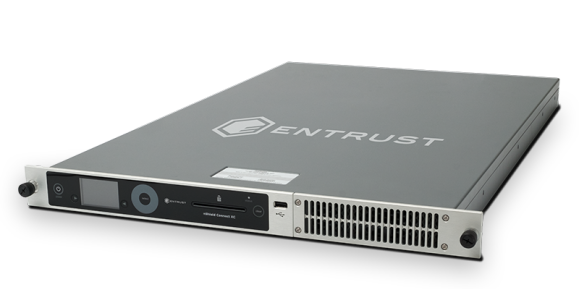Dec 08, 2020
Blockchain network participants require assurance that each user is authenticated and each transaction is valid
Blockchain technology represents significant new opportunities to transform the way data is shared and value is transferred, but along with its benefits come new challenges. One of the primary roadblocks to blockchain’s broader adoption is the resolution of a critical issue: security.

As organizations continue to find new and innovative use cases for blockchain, security must be kept top of mind. Only by establishing that each user is an authorized participant of a distributed ledger, and that each transaction submitted to the blockchain is digitally signed, can we advance our use of this transformative technology and reap the rewards it promises.
Entrust nShield can help your organization secure its digital transformation and confidently use blockchain through strong authentication, digital signatures, hardened security for root keys and more.
Challenges
Authenticating Participants
Before individuals are allowed to participate in a distributed ledger, they must be authenticated using highly secure methods.
Trusting Transactions
Participants of a network need assurance that each transaction can be trusted. Otherwise, trust in the network itself will be in question.
Securing the Keys
While blockchain technology itself has proved tamper-resistant, cryptographic keys are essential to secure access to a distributed network and ensure transactions are valid. These keys can become vulnerable and stolen via network breaches, as seen in the attacks on cryptocurrency exchanges in recent years.
Solutions
Strong Authentication
Similar to banking and other industries, establishing trust in a blockchain network depends on strong authentication of participating users and devices, underpinned by cryptographic processes. Organizations worldwide rely on Entust nShield HSMs as the foundation of their high-assurance user authentication methods.
Digital Signatures
Transactions submitted to the blockchain are digitally signed using a private key to confirm that the entry comes from the user and to prevent any alterations. Entrust nShield HSMs protect the underlying root keys that are used for the issuance and revocation of private keys.
Hardened Security for Root Keys
Entrust nShield HSMs provide FIPS-certified, tamper-resistant protection for the root keys that underpin network user authentication and transaction validation. Field-proven nShield HSMs are available in a range of form-factors and performance levels to suit particular environments.
Benefits
Delivering the Root of Trust
Entrust HSMs provide a strong root of trust for the keys and cryptographic operations that enable organizations to build, deploy, and operate blockchain-based transaction networks with confidence.
Security
nShield HSMs provide leading protection for root keys that fulfills even the most stringent security requirements.
Scalability
nShield HSMs can be clustered for greater performance and availability, enabling the scalability of blockchain operations without sacrificing security.
Stronger Compliance
nShield HSMs meet FIPS 140-2 Level 3 and Common Criteria EAL 4+ certifications, meaning organizations in highly regulated environments can execute on blockchain strategies while satisfying compliance requirements.


